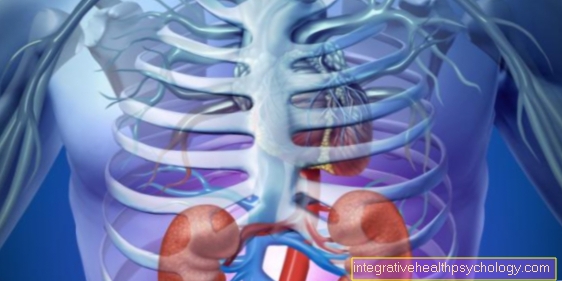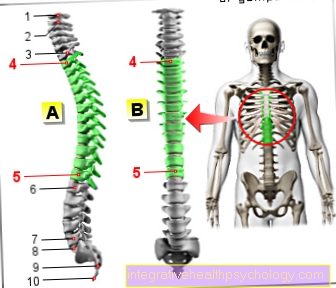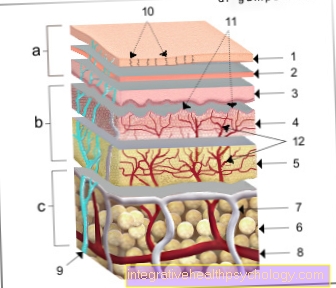Vitamins in Pregnancy
introduction
Especially during pregnancy, many women tend to take extra vitamins in the form of dietary supplements because they want the best for their child. An increased intake of vitamins during pregnancy also makes sense, as both mother and child need to be well looked after. However, this can usually be achieved through a healthy diet. The additional intake of vitamin preparations makes sense for some vitamins, as there is an increased need during pregnancy and a deficiency can lead to developmental disorders in the unborn child. However, this does not apply to other vitamins at all.
Read more on the topic Diet in Pregnancy and Prohibited Foods in Pregnancy

Overview - What vitamins are there?
Basically, in pregnancy, the Vitamins folic acid (Vitamin B9), vitamin C, Vitamin D and the Vitamins B.1 (Thiamine), B.2 (Riboflavin) and B.6 (Pyridoxine) needed.
As a rule, the additional need for vitamins during pregnancy can be compensated for by increased consumption of fruit and vegetables.
However, this is hardly possible with folic acid. Folic acid is especially needed in early pregnancy and a deficiency can have serious health consequences for the child. The additional intake of iodine is also useful.
The B vitamins are mainly found in whole grain products, potatoes and milk. A deficiency in vitamin B is very rare in Western countries, so it is usually not necessary to take vitamin B supplements. However, this could be necessary for vegetarians.
Vitamin D can be produced by the body itself when the skin is exposed to sunlight. About 10 minutes of sunlight a day is usually enough to produce enough vitamin D. Since the sun only rarely shines in the winter months, substitute preparations may be necessary here. The level of vitamin D in the blood should be checked by the doctor. If this should be below 30 ng / ml, the attending physician will advise about a vitamin D substitution.
Vitamin C can be adequately absorbed through the diet through adequate intake of fresh fruit and vegetables.
Vitamin A can be absorbed through milk, egg yolks or carrots. A deficiency is very rare, but there can be an excess of vitamin A, which must be prevented especially during pregnancy. It can lead to deformities, which is why vitamin A should not also be taken in tablet form.
Also read our article: Vitamin A deficiency
Folic acid

Folic acid is very important for the development of the child, especially in early pregnancy.
Since the expectant mother can often not only meet the increased need for folic acid through an appropriate diet, it is usually necessary to take folic acid supplements.
Folic acid is required by the baby as early as the third to fourth week after fertilization in order to be able to develop well. However, many women do not even know at this point that they are pregnant.
Read more on the topic: Folic Acid During Pregnancy
Women who want to have children are therefore recommended to take 400 to 800 micrograms of folic acid a day before they become pregnant in order to prevent any developmental damage to the child.
You might also be interested in Tips for getting pregnant
A folic acid deficiency can result in malformations such as spina bifida or even a miscarriage.
Read more on the topic Miscarriage
The preparation should continue to be taken during the first months of pregnancy.
Folic acid is also found in potatoes, meat, dairy products, cabbage and fish. It is recommended that you eat plenty of raw fruits and vegetables as folic acid is destroyed when you cook it.
Read more on the subject at: Foods with folic acid
Since many folic acid preparations also contain iodine, women with a malfunction of the thyroid gland must pay particular attention to the choice of preparation.
Find out more about dietary supplements: Femibion®
Are Vitamins Really Necessary?
Of the Increased need for most vitamins in pregnancy can be done by having a healthy diet sufficient fruit and vegetables are covered. Whole grain products should also be eaten to meet the needs of B vitamins.
Except for the additional intake of folic acid and possibly iodine It is usually not necessary to take vitamin supplements.
However, since folic acid is very important for the development of the child, especially in early pregnancy, and a deficiency can have serious health consequences for the child, it should be Folic acid tablets before and during pregnancy be taken.However, there are exceptions for taking additional vitamins Vegetarians and especially vegans that often cannot adequately cover their vitamin requirements through diet. Because of the possible vitamin and nutrient deficiency is particularly the vegan diet during pregnancy risky.
Magnesium, Vitamin B, or other vitamins should therefore not be taken in addition with a balanced diet, as overdosing can lead to malformations in the child.
Vitamins for nausea in pregnancy
In the Development of nauseathat often during early pregnancy occurs, becomes dem vitamin B6 (Pyridoxine) ascribed a major role. That is why there are now preparations that contain vitamin B6 and can be taken during pregnancy in order to prevent the To relieve nausea.
Also the Vitamins B.1 and B12 are associated with nausea and a Increased intake of vitamins can reduce symptoms mitigate. However, this should only be done after consulting the attending physician.
Also Combination preparations of the vitamin B complex are available and can be used against nausea during pregnancy.


























.jpg)


